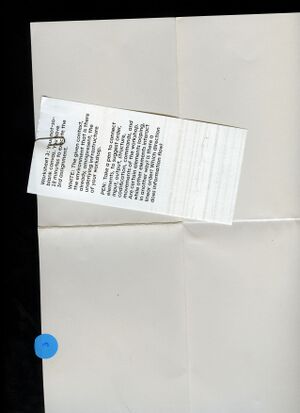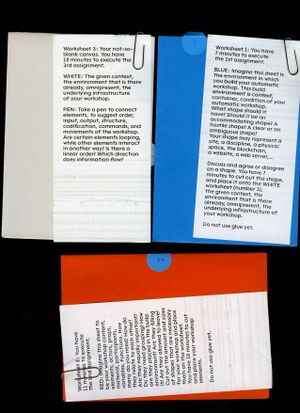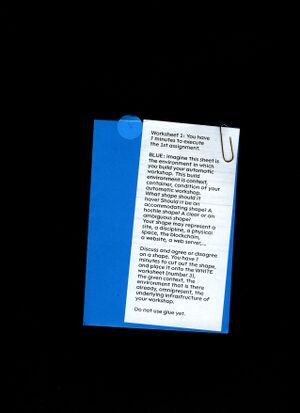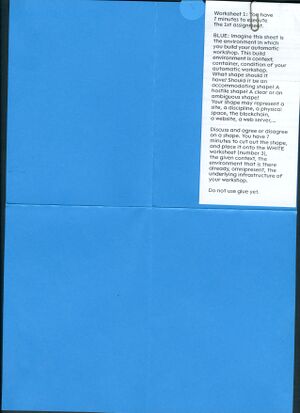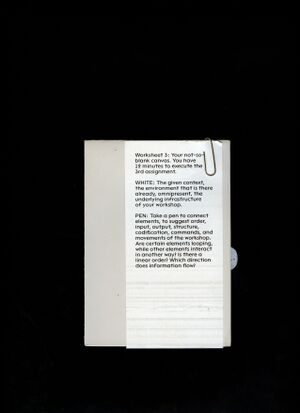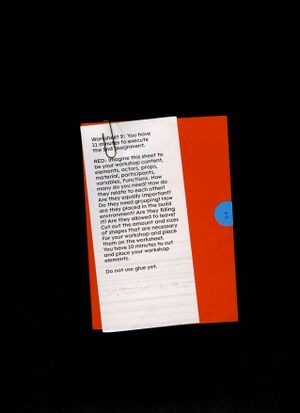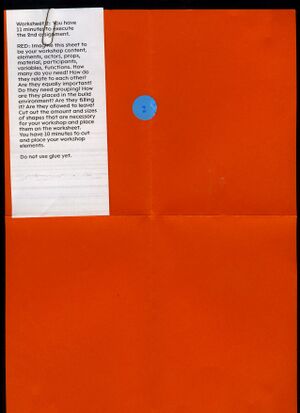Scripting-Workshops: Difference between revisions
No edit summary |
No edit summary |
||
| Line 21: | Line 21: | ||
''> text still needs to be edited '' | ''> text still needs to be edited '' | ||
<div class="block"> | |||
The term 'workshop' travels through a manifold of contexts, crossing boundaries between art and activism, between different disciplines and institutions, between commercial and educational contexts. At times, it seems anything can be a workshop. | The term 'workshop' travels through a manifold of contexts, crossing boundaries between art and activism, between different disciplines and institutions, between commercial and educational contexts. At times, it seems anything can be a workshop. | ||
| Line 118: | Line 120: | ||
These session generated important insights and concrete input for the editorial process of this publication you are holding in your hands. That is, moving away from a | These session generated important insights and concrete input for the editorial process of this publication you are holding in your hands. That is, moving away from a | ||
Revision as of 11:47, 23 October 2022
Scripting Workshops
Subtitle
> text still needs to be edited
The term 'workshop' travels through a manifold of contexts, crossing boundaries between art and activism, between different disciplines and institutions, between commercial and educational contexts. At times, it seems anything can be a workshop. Furthermore the workshop format seems often expected to be highly productive, where outcomes can be achieved, learned or produced within a short amount of time. Some workshops draw inspiration from rapid prototyping, sprints, or hackathons, all formats and methods that originate in soft- and hardware development. Alongside the establishment of the 'new economy', the workshop has become an attractive format for time-boxed collaboration within tech companies and creative agencies.
The workshop format seems to function well within the context of commercial conferences, incubator programs, and creative retreats and at times it seems the workshop is understood as a product itself. Taking place outside of the daily work routine, workshops ought to be fun while enhancing the participants’ CV.
The workshop undoubtedly also plays an important role for the H&D collective since our first workshop-based event under the title 'Hackers & Designers' in 2013. Since then, the workshop format has been interpreted, practiced and circulated in various ways and has significantly influenced how H&D evolved as a collective. In contrast to the workshop paradigm described above, H&D workshops are not much concerned with products or productivity (in neo-liberal terms).
The aim of workshops in the context of H&D is not primarily to fix a presented problem. There is usually no imposed competitive element, and making processes do not necessarily result in producing finalized outputs. On the contrary, the artifacts produced during the workshops have the characteristics of disposals rather than proposals. They are the side-products of a process.
Work the Workshop
In 2018, H&D organized the fourth edition of the H&D Summer Academy (HDSA). For the first time we did not differentiate workshop participants from workshop facilitators in our open call. People who were interested in joining the HDSA would all apply by submitting a workshop proposal. Thus, they would commit to facilitating a workshop as well as participating in the full duration of the two week long workshop program. No prior experience in teaching or facilitating workshops was required. As part of the preparation towards the HDSA in 2018, we introduced a peer review process during which workshop proposals would be reviewed by everyone who had submitted a workshop. That way, we involved workshop facilitators in developing each other's workshop preparations and created connections between them before the actual HDSA began.
However, it seemed that the lack of specificity as to what exactly characterizes the 'workshop' as a format, made it hard to describe, defend or critique the proposed workshops in a peer review process. The submitted workshop descriptions remained brief. They either reflected on the subject of the workshop or on the technicalities, but rarely did they address both, or in ways that invited suggestions and feedback on the workshop. The proposals did not incorporate descriptions of how a workshop would actually play out in a space, over a certain amount of time and did not take the different needs and levels of expertise of the participants into consideration. This observation led me to submit a workshop proposal with Shailoh Phillips, who was at the time my colleague at the research consortium ‘Bridging Art, Design and Technology through Critical Making’. Our workshop would take place at the beginning of the HDSA and would focus on the format of the workshop itself. The title was Work the Workshop.
add images: 'Shailoh & Anja behind glass' Caption: Anja Groten and Shailoh Philips behind a glass window observing how the workshop executes 'itself', Work the Workshop, H&D Summer Academy 2018. 'Workshop in a bag' Caption: Workshop toolkit from Work the Workshop, H&D Summer Academy 2022. Each prompt was clipped to a piece of paper. The prompts instructed participants on what to do with the piece of paper. The workshop was intended to be self-explaining – executable like a ‘script' without a facilitator.
We formulated exercises that were meant to offer different perspectives on everyone's workshop plans. The exercises were intended as an invitation to view the workshop itself as a medium, something that could be externalized, tweaked and reiterated. The first exercise was to imagine the workshop as a set of instructions, almost like an algorithm or script that could be executed without the workshop facilitators being present. We also presented this exercise as a script—delivered without us workshop facilitators being present in the space. We prepared the script and workshop kit in such a way that it would explain itself. This exercise was inspired by THE THING, an automatic workshop. Writing up a complete workshop script that can be executed without a facilitator present is a tedious process. Aspects of the workshop that might usually be improvised, needed to be scripted and explained. Unexpected outcomes needed to be anticipated. However, it was also important to leave some space for interpretation and improvisation.
The second exercise asked participants to attend to what we called 'workshop props' – materials and equipment that frequently appear in workshop settings, such as sticky notes, a white board, a projector, chairs and tables arranged in a circle, in addition to cookies and coffee. First, we asked the workshop facilitators to create an inventory of their workshop props and then replace them with other self-made props in order to play out the consequences. The last exercise invited participants to physically rehearse the workshop at a high speed. Workshop facilitators had to physically move their participants' bodies around, in the way they imagined participants would be taking up space throughout their workshop.
Images: Work the workshop at HDSA2018 https://wiki.hackersanddesigners.nl/images/6/67/Worktheworkshop5.jpg https://wiki.hackersanddesigners.nl/images/b/b9/Worktheworkshop1.jpg https://onions.io/dump/how-tos/Workshop-toolkit.jpg]
This 'meta' workshop about workshops did not intend to provide a recipe or protocol for the perfect workshop. Rather than showcasing best practices, the intention behind facilitating a workshop about workshops, was to explore the format of the workshop itself as it has become a substantial ingredient for H&D's activities but had remained mostly unquestioned and never clearly articulated. With every new group we are used to slightly adjusting the ways in which we approach the workshop. We wanted to attend to the ways the workshop format itself can be conceptualized and designed, including unforeseen aspects. Furthermore, we wanted to facilitate exchange regarding past workshop experiences and expectations in order to find ways of articulating similar and different incentives for facilitating and participating in workshops. As we were all facilitators as well as participants, we had a shared interest in having a discussion and exchange about how we wanted the workshops to play out, how we would support each other with feedback, and perhaps how we would take the opportunity to rethink the workshops within their specific context.
The way a workshop unfolds depends on many variables, which are conditioned by the environment the workshop takes place in. It was useful to hear about the various workshop experiences and expectations of participants, in addition to articulating collective desires but also insecurities that were specific to that particular temporary group—a first step in making individual and collective intentions explicit and in creating a workshop atmosphere before and along with embarking on the workshop program together.
In the following iterations of the HDSA, H&D continued exploring the BYOW (Bring your own workshop) format, as an attempt to decentralize organization and create an egalitarian learning environment that responds to the particular assemblage of people, tools, environments.
In some respects this practice of inviting workshop hosts to write detailed outlines of their workshop and letting others feedback and contribute to their development, prepared us for the disembodied experience of organizing, hosting and participating in workshops from 2020 onwards. The notion of the 'workshop script' evolved from commitment towards the workshop format but later on evolved further because of a necessity to stay connected throughout the global COVID19 pandemic. The workshop script became a 'thing held in common', a concept and artifact, something that was shaped and reshaped collectively and could be referred to while members were distributed and trying to continue organizing, facilitating and participating in workshops remotely.
In the context of H&D the workshop script expresses a particular (not universal) relationship to the workshop format and explicates the collective effort of staying connected, even while there are other forces at play that seem to work against that effort. Rhetoric such as rapid, sprint, agile, marathon, insinuate and reproduce a general perception of the workshop as a recipe for high-velocity or result-oriented production. By resisting one definition of 'workshop', for instance by including participants, organizers and facilitators in questioning and redefining the particular conditions of workshops every time there is a new occasion, the workshop as such becomes less 'agile', less of a 'panacea', less adaptable to all and any context.
The publication 'Network Imaginaries' (H&D, 2021) was a first attempt to publish workshop scripts. The scripts developed by workshop hosts of the 2020 HDSA edition are added to the publication as an annex. Yet, what is missing in my view, is a thorough contextualization of their activation, the particularities of the practices they evolved from.
In 2022 I revived the Workshop about Workshop in the form of two workshop series, one took place in June at Page Not Found in The Hague, followed by a second iteration a few weeks later at TROEF in Leiden. I invited participants to develop different forms of articulation around workshop-based practice, from their own respective experiences.
These session generated important insights and concrete input for the editorial process of this publication you are holding in your hands. That is, moving away from a
